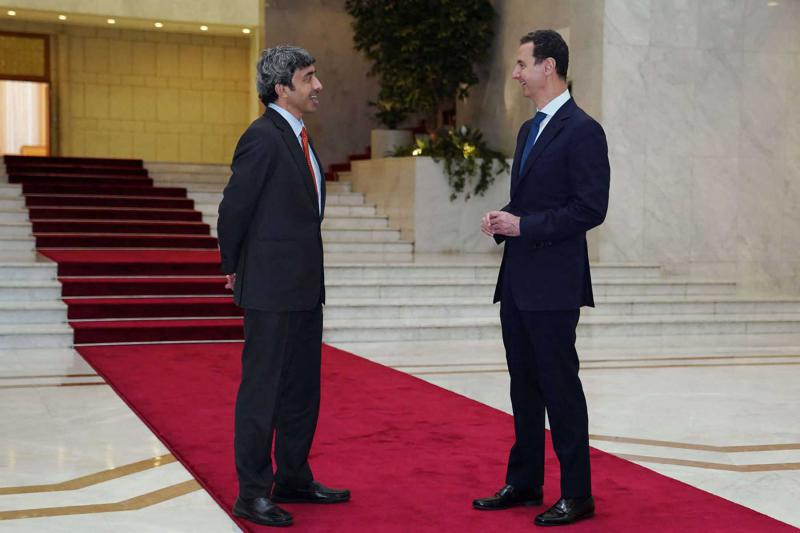
Syria’s President Bashar al-Assad (R) talks to UAE Foreign Minister Sheikh Abdullah bin Zayed Al-Nahyan in the capital Damascus, November 9, 2021. (AFP)
by thearabweekly.com -- Israel sees benefits in terms of curtailing Iranian influence in Syria arising from the Gulf states' progress towards normalisation with the Damascus regime, said an Israeli media report quoting "a senior diplomatic official" in the Jewish state. The unnamed source, cited by Israeli news website Ynet, said that closer ties to Arab Sunni states might indicate a willingness on the part of the Syrian regime to curb relations with Iran and Shia allies. “During the coming year there will be opportunities to reduce the Iranian presence in Syria,” predicted the Israeli official. The Israeli source highlighted the importance of the economic factor as the rapprochement between Damascus and Gulf countries could help Syria deal with its financial crunch and shore up the stability of the regime. Syria faces a tough economic crisis due to war-related expenditures and US and European restrictions.
The Israeli official described Iran’s nuclear programme as “a great threat to Israel, even an existential threat" and the development of an atomic weapon by Iran would “exacerbate the terror activities of its proxies in the area.” The source did not rule out an Israeli strike on Iran's nuclear facilities if the ongoing talks in Vienna do not manage to limit the threat of Israel building a nuclear bomb. But the Israeli official noted that in case of a military attack on Iran, Lebanon's pro-Iran party Hezbollah and the Palestinian militant faction Hamas might enter the fray in support of Tehran. Hezbollah “has very significant attack capabilities that pose a challenge to us,” the Israeli source added. “We are conducting defensive preparations in the northern arena.” Israeli Prime Minister Naftali Bennett was quoted as telling the Knesset’s Foreign Affairs and Defence Committee, Monday, that Israel was conducting "a multifaceted war" against Iran and its regional proxies, especially Hezbollah and Hamas. He expressed the view that financial constraints and pressures at home limit Iran's ability to carry out its regional designs. Since last July, a number of Arab countries has increasingly made moves to normalise relations with the Assad regime, through meetings, agreements and economic understandings. The moves involved Jordan, Egypt and the UAE, in particular.
Last November, UAE Foreign Minister Sheikh Abdullah bin Zayed Al Nahyan was the first high-ranking Gulf official to visit Syria since most GCC countries severed diplomatic relations with Damascus, following the outbreak of the Syrian war in 2011. Observers described the visit, in which the UAE foreign minister met Syrian President Bashar al-Assad, as a step which opened a new chapter with Syria and paved the way for other initiatives to rehabilitate the Damascus regime. Analysts believe that the war in Syria has been militarily resolved in favour of the regime forces and their allies since 2018, with the departure of the armed opposition fighters from their positions on the outskirts of the capital and the nearby governorate of Deraa. Since then, the chances of the opposition overthrowing the regime militarily have virtually amounted to "nil". Many Arab countries have subsequently concluded that it was in their interests to normalise links with the regime in Damascus. Encouraged by a number of Arab governments, led by Jordan, Arab League member states are debating whether the timing is right to restore the active membership of Damascus in the League and normalise with its regime.
The pan-Arab organisation had suspended Syria's membership in October 2011 and called for the withdrawal of Arab ambassadors from Damascus until the regime fulfilled its commitments to the protection of civilians. At the beginning of the Syrian war, Arab countries provided support to Syrian opposition factions after the Syrian protests turned into an armed insurrection met by bloody repression on the part of the security forces. The military operations carried direct repercussions on the security and stability of Syria's neighbouring countries of Lebanon, Iraq and Jordan.
The UAE and Bahrain reopened their embassies in Damascus at the end of 2018, at the level of chargé d'affaires. In October 2020, the sultanate of Oman returned its ambassador to Damascus, becoming the first Gulf country to restore its diplomatic representation at the ambassadorial level. According to media reports, Saudi Arabia reopened direct channels of communication with Syria last May, with the visit of the head of the Saudi intelligence service, Lieutenant-General Khaled al-Humaidan, to Damascus and his meeting with Assad and the head of the National Security Office, Major General Ali Mamlouk.
The Syrian regime is also intensifying contacts through Lebanon. For the first time, Damascus received an official Lebanese delegation prior to the formation of the government of Prime Minister Najib Mikati, who has maintained a close relationship with Damascus for years. His ties to Syria were reinforced by huge investments in the local economy. Arab countries neighbouring Syria see high stakes in terms of geopolitical and economic interests, especially with regard to ensuring the safe return home of Syrian refugees from Lebanon and Jordan.
.jpg)




